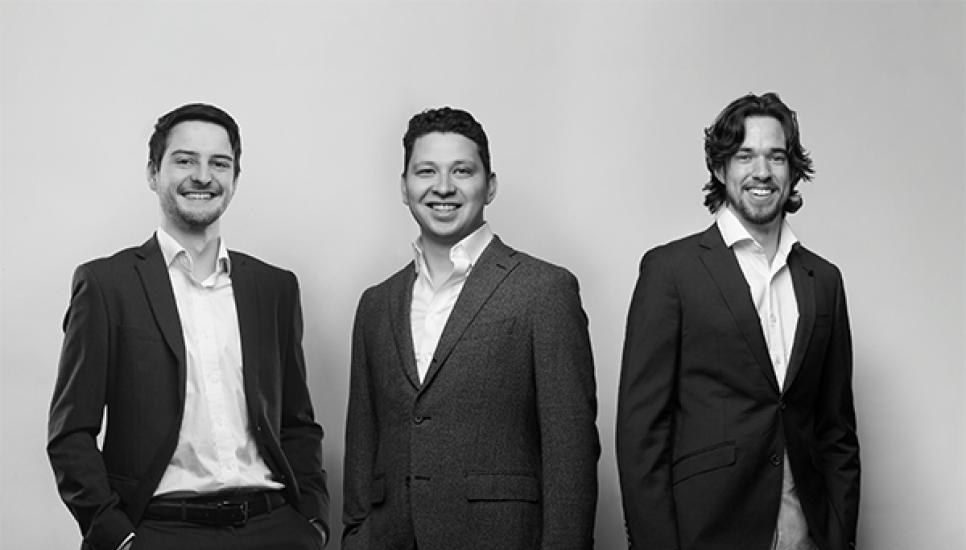Why StrongRoom AI cares about ADEs and patient adherence

When Max Mito, Chris Durre and Kieran Start (pictured above), the co-founders of Melbourne-based StrongRoom AI, set out to tackle patient management, administration wasn’t the first thing they thought they’d have to confront.
“Initially, we explored the use of world-leading facial recognition technology to match with people’s medical records as an initial concept,” explains Mito, the firm’s chief executive officer since inception. “We felt as if this could solve so many issues within healthcare, including ensuring patient data was accessible when the patient needs it most.” Their goal was to transform the global landscape of medical data and augment decision-making with the best machine learning available to catch emerging illnesses earlier, before they become acute or, worse, irreversible.
After a summer of exploring the challenge, couped up in Chris’ parents’ guest room continuously coding and collaborating with curious medical facilities, it became clear this would be only possible far into the future. The immediate challenge, rather, was medication records.
“We were shocked with how many of the facilities we worked with, which we assumed to be highly sophisticated, were still using pen and paper to document patient records,” says Durre, StrongRoom AI’s chief technical officer. Illegible handwriting, mis-documentation, paper-trail loss, mountains of paper and rickety software which didn’t connect to interdependent applications… the list of issues, and opportunities for errors, were abundant.
“It was, and still is to a surprising degree, a mess,” says Mito “We realised that people were passively getting ill or dying from care mismanagement, and specifically poor drug administration systems.”
Working initially on opioid replacement therapy administration within pharmacies and, later, elderly care facilities and hospitals on broader drug management workflows, the team rapidly found a multitude of instances where administration can and does break down. When this happens, they found either a patient suffers a setback in their treatment due to adherence issues or when an ADE occurs.

ADEs, or Adverse Drug Events, are a worldwide phenomenon whereby patients react negatively to drugs they’ve been administered, resulting in a relapse of illness or even death. ADEs can occur for various reasons, stemming from systemic healthcare failures in drug prescribing to overall administration, and it’s estimated by the National Institutes of Health (NIH) that ADEs cost the global healthcare system roughly one trillion in associated services each year. ADEs are the most frequent cause of hospitalisation, account for 20% of hospital readmissions, and are between the fourth and sixth leading cause of fatality.
“And they’re totally avoidable,” says Durre. “But to prevent them we’ll need to move towards technology-augmented services, with systems that are highly integrative, adaptable based on needs and provide care-givers valuable insights that are quickly actionable.”
Since 2019, StrongRoom AI has been growing domestically, 200% year-on-year, making it one of the fastest-growing startups in healthcare. An enterprise solution for any facility administering controlled drugs, the company has taken their domestic market by storm, now servicing 40% of pharmacies (StongerER), 25% of elderly care homes (StrongCare), and 35% of hospitals (StrongHospitals) across Australia, and now, internationally, within the UK via a strategic acquisition.
“We’ve got aggressive local market capitalisation targets, but our sights are focused on going global, fast,” says Mito. “While there’s a lot of appetite for our Generation-I software across the world - which are our modular workflow digital infrastructures - what’s really getting attention is StrongPro, our Generation-II software.”
Released in April this year to augment decision-making, StrongPro is a set of data analysis and medication adherence tools designed for clinicians and facility managers, surfacing valuable insights to make more informed decisions, powered by artificial intelligence.
“Generation-I was about creating robust digital architectures to streamline and automate workflows for care providers based on their specific needs, enhancing efficiency while significantly reducing administration errors,” says Mito. “StrongPro essentially sits on top of that infrastructure, it’s about transforming care management to become proactive versus passive, helping clinicians leverage data in novel ways to focus on patient outcomes.”
StrongRoom AI sees itself as an emerging partner for all stakeholders trying to improve and manage patient outcomes, regardless of the healthcare system - public, private, or in-between. By providing powerful analytical tools to businesses and governments alike, the company hopes the pharmacy community can quickly demonstrate to policymakers how changes will potentially intensify adherence problems for the general public and enable people to live stronger, for longer.
In tandem, StrongRoom AI is intensely focused on facility cost and time control. In a world where healthcare costs are expected to rise by 2025 to roughly 20% of global GDP, care providers are now more than ever grappling with the ramifications.
“If we grow to service 70% of the Australian and UK market across our key customer verticals, we’ve calculated that we could save healthcare providers roughly $2.7 billion over the next 10 years in costs,” says Mito. “And if the entire global healthcare industry introduced some kind of medication management software like ours, we’ve estimated they could save somewhere around $23 billion a year.”
For more information on Strongroom AI, click here.
StrongRoom AI will exclusively present in-person as Campden Wealth returns to Lausanne, Switzerland, for the 33rd edition of the MedTech Investing Europe Forum (MTi) on June 27 and 28.
For further information, contact Kevin Grant via kevingrant@campdenwealth.com.
Campden Wealth is not an investment advisory service and is not a registered investment adviser or broker/dealer and has performed no due diligence and does not endorse any investment services, strategies or managers listed in Managerlink or at any other Campden Wealth event. You should perform your own extensive due diligence.






